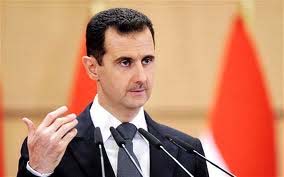
Reuters, Beirut :
It was not so long ago that Bashar al-Assad’s enemies thought he was finished.
In the summer of 2012, the rebels were not just at the gates of Damascus, but inside the capital, preying on Assad’s harried forces.
His government had lost big chunks of Syria’s territory and a string of strategic towns, and a small number of loyal and tested army units were rotating around the country in an exhausting attempt to hold back rebel advances on many fronts.
Now, even as the United States seeks to increase aid and training to moderate rebels to fight Assad’s forces, U.S. officials privately concede Assad isn’t going anywhere soon.
Buoyed by a sequence of victories over the past year, won in large part through Iran and Hezbollah, its Lebanese paramilitary proxy, Assad will be elected president this week for a third seven-year term, symbolically contested by selected opponents playing walk-on roles to pad out the main drama.
The old Syria – at its core a security state run by the Assad clan, their Alawite allies and selected partners from other minorities and the Sunni majority – is reasserting itself.
Assad himself, who had almost dropped out of sight and, on the rare occasions he did appear in public, looked troubled and strained, has re-emerged looking relaxed, confident and smart as he gets out and about, campaigning with his wife, Asma.
There is a note of triumphalism when he speaks, a sense that the tide of the crisis, that began as a popular revolt against his rule, has turned in his favour.
Despite the loss of 160,000 lives and the displacement of 10 million Syrians, the shattering of cities like Homs and Aleppo and wholesale destruction of infrastructure and the economy, Assad proclaims Syria will become again what it once was.
During a visit to the ancient Christian town of Maaloula on Easter Sunday, after it had been recaptured from rebels, he told soldiers: “We will remain steadfast and bring security back to Syria and defeat terrorism. We will hit them with an iron fist and Syria will return to how it was.”
“The battle may be long but we’re not afraid; Syria has been like that all its life,” he said on another stop at nearby Ain al-Tina. “As long as we’re together…we’ll rebuild it. However much they destroy we will rebuild and make it even better.”
Such is his confidence that he is contemplating retaking the whole country after the presidential election, according to a Lebanese political ally who sees him regularly.

